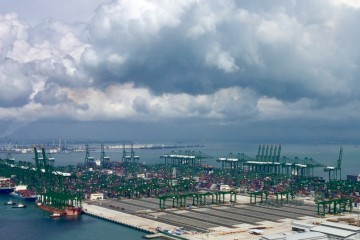Information technologies are killing the middleman. We have more information than ever before; as a result we see the decline of intermediaries in many areas. Thanks to the Internet, we get access to pools of information that we can assess and compare, so we no longer need travel agents to book our flight tickets or real estate agents to show us the local houses for sale. Buyers and sellers can get in direct contact, avoiding commission to be paid. Good for buyers and sellers, too bad for the middleman. His decline will also change the way freight transport is organised: difficult times ahead for freight forwarders and more possibilities for shipping companies to link directly to consumers.
The maritime transport chain is traditionally opaque, non-transparent and fragmented. Ideal for middlemen, such as freight forwarders and other logistics providers, who make a living taking charge of the arduous task of organising smooth supply chains. But progress is also starting to touch the shipping sector, in the form of better information, data exchange and traceability. Start-ups have been created with the simple idea: if we can book a flight with a few clicks, why not container transport? If we can follow exactly where are the parcels that we sent, why not do the same for containers? Such initiatives will drive what has happened in many other sectors already: the death of the middlemen. Data sharing platforms will give freight forwarders a real good run for their money. What is more, it might lead to better comparability of services, which is good for shippers, but also for shipping companies as it provides a way to improve performance.
The decline of middlemen will also affect shipping in a different way. Maritime cargo transport is almost always business to business. This will change. Just as we no longer need bookstores as we can have books shipped directly, we would not need car dealers, if cars could be ordered online and be delivered at your front door. One could even think of car transport in containers that would facilitate such a development, as it would simplify the land transport leg to the customer. Such a development would change the relation between consumers and cargo transport dramatically. It would require a mind shift of shipping companies. And it might create business opportunities for the middleman of modern times: the App.
3 Comments
Comments are closed.




Hello Olaf, interestingly writing on another angle (Difference between Vessel Agent and Carrier Agent (http://shippingandfreightresource.com/vessel-agent-and-carrier-agent/)) I had posed a similar question to my readers “Will the role of the vessel agent and carrier agent stay or die away with the furthering of alliance, progress in technology, direct communication and automation..??”..
As a Chartered Shipbroker myself, the above maybe a cause for concern, however many shipbrokers and companies are embracing the new technologies to keep up with the times..
This uncertainty, whether relating to the role of an agent or the way shipping is progressing, is also creating kind of an expectation of bigger and better things to come.. But WHEN, is the question..
So for now, I guess we just have to hurry up and wait.. 🙂
Really interesting article. Working for a freight forwarding company I can safely say we have seen first-hand the change from carriers, turning to online booking systems. In terms of creating a feeling of ‘direct contact’ from our experience it’s the exact opposite, where carriers can hide behind huge operating systems… And it’s not pleasant.
Our experience of the new ‘Uber’s for shipping’ has been nothing short of disappointing. With systems being launched that aren’t properly developed, ‘your route/ rate cannot be found’. The major difference in the shipping sector compared to online booking systems /apps is the issue of collaboration. Yes you can book your taxi with uber because it’s a one to one transaction through fantastic technology. Yes you can book your hotel on airbnb because it’s you and the vendor at the other end. The chain of people involved in a single container shipment is above and beyond, with no one person having total overall control like in B2C consumer logistics. If the parcel isn’t delivered the blame only lays with one part of this chain, the logistics company or the retailer. As a forwarder we are subject to the wills of the ports and terminals, carriers, shippers, stevedores, surveyors, customs and if one part of the chain breaks it falls as fast as a house of cards.
There’s also the issue of personal relationships between massive corporations. Every forwarding company and every freight agent have their own buying power and relationships with carriers. One rate for one company may be completely different for another depending on the trade lane traffic they can provide the carrier. Unless we standardise the basic rate for a container across the industry this won’t change. And even if it was implemented would we want to see the effects as present with uber? Where fares have been pushed so low that taxi drivers aren’t even paid a living wage anymore in some parts of the world?
I would like to hope that the future of our world is not based on faceless online encounters. We visit a car dealership for the experience, the satisfaction of selecting the right product, the trust built from the test drive and the bargaining with the salesman. All these tangible aspects of a sale are still crucial for purchasing decisions. We no longer need bookstores? I love bookstores and feel it is a massive cultural part of our world that should never be lost. People still value people. They appreciate others value in the supply chain and lean on their expertise… this is something technology can never really replace.
[…] how near that technology has come. The problems remain in regulation and navigation. And over on Shipping Today, Olaf Merk points to the end of the middleman as technology connects buyers and sellers. The new […]